Syrian Troops Continue Crackdown Amid International Pressure
The world is starting to denounce the crackdown in Syria, but the reaction seems unlikely to go much beyond strongly worded statements.
Syrian military and special police are continuing their crackdown on rebellious cities, despite increasingly loud international condemnation:
There has been an intensified campaign since Sunday, apparently aimed at preventing protests from swelling during Ramadan, when Muslims throng mosques for special nightly prayers after breaking their daily, dawn-to-dusk fast. The gatherings could turn into large protests.
As expected, protests erupted Monday evening across the country, with hundreds turning out in cities including Homs, Latakia, the Damascus suburbs and the eastern city of Deir el-Zour.
There were scattered protests in Hama, but heavy shelling kept most people inside. Hama has been the target of the recent operation because it has emerged as an opposition stronghold.
The city has a history of defiance to the Assad family 40-year dynasty in Syria. In 1982, Assad’s father, Hafez Assad, ordered the military to quell a rebellion by Syrian members of the conservative Muslim Brotherhood movement. The city was sealed off and bombs dropped from above smashed swaths of the city and killed between 10,000 and 25,000 people, rights groups say.
Hama-based activist Omar Hamawi told The Associated Press that troops advanced about 700 yards (meters) from the western entrance of the city overnight, taking up positions near homes and buildings in an area known as Kazo Square. He said the force consisted of eight tanks and several armored personnel carriers.
Hamawi, who spoke to the AP by telephone, said troops were also reinforced on the eastern side of the city around the Hama Central Prison, an overcrowded jail.
He said residents there saw smoke billowing from the prison overnight and heard sporadic gunfire from inside, leading some to believe the inmates were rioting. He added that it was impossible to know what was exactly going on in the prison or whether there were casualties inside the tightly controlled facility.
The activist also said that parts of Hama were hit Tuesday morning with heavy machine gun fire after sporadic shelling overnight. He said a shell hit a compound known as the Palace of Justice in the city center, causing a huge fire that burned much of the building, which is home to several courts.
Meanwhile, the outside world is starting to notice what’s going on in Syria and to condemn the regime, although it’s doubtful that anything can or will be done to stop the crackdown:
UNITED NATIONS — Syria’s diplomatic isolation deepened Tuesday in the aftermath of an intense military assault on the city of Hama and other hotbeds of the four-month-old antigovernment uprising.
Russia, an important ally of Syria, signaled new support for possible Security Council action, Syrian democracy activists received a warm welcome in Washington, Italy withdrew its ambassador to Damascus, and the top United Nations rights official warned Syria that “the world is watching.”
The developments came as unconfirmed accounts of artillery fire in Hama were relayed by rights groups in Syria, saying that military forces there had begun shelling the city for the third day in a row. By some estimates, more than 100 Syrians have died since Sunday, the majority of them in Hama, as the forces of President Bashar al-Assad expanded an effort to thoroughly crush the uprising against him. More than 1,400 Syrians have been killed since the uprising began in March.
At the United Nations, the Security Council convened for a second day to discuss possible action that would punish Syria. Russia and China, two of the Council’s permanent members, had threatened previously to veto a proposed resolution, but Kremlin officials in Moscow suggested on Tuesday that they might have softened their position. Whether that means Russia might now support a Security Council resolution or some lesser form of reprimand aimed at Syria remained unclear.
“We are not categorically against everything,” Sergei Vershinin, the head of the Russian Foreign Ministry’s Middle East and North Africa Department, told reporters in Moscow. “We are categorically against what doesn’t help bring forward a peaceful settlement.”
In Washington, the Obama administration, which has toughened its line toward Syria in recent weeks, officially welcomed Syrian democracy advocates based in the United States. Secretary of State Hillary Rodham Clinton met with them on Tuesday as more American lawmakers called for punitive steps against Mr. Assad and his officials, beyond the economic and travel sanctions already imposed.
The American antipathy for Mr. Assad was also on display at the confirmation hearing in Washington for Robert S. Ford, the American ambassador to Syria, who called the crackdown on protesters “brutal” and “outrageous.” Mr. Ford, who has been serving in Syria since January under a recess appointment by President Obama, told the Senate Foreign Relations Committee that the behavior of Mr. Assad’s government “has been atrocious” and that Syrians were already planning for the day when he is longer president.
Navi Pillay, the United Nations high commissioner for human rights in Geneva, bluntly criticized what she called the Syrian government’s effort to shield the brutality of its crackdown from public view by banning outside news coverage and preventing a U.N. fact-finding mission from visiting.
“The world is watching, and the international community is gravely concerned,” she said on Tuesday, according to Agence France-Presse. “The government has been trying to keep the world blind about the alarming situation in the country, but they are not succeeding.”
Outside of sanctions against the Syrian regime and the Assad family in particular, it’s hard to see what the international community either can or will do in this situation. The odds of a Libya-like international intervention seems unlikely for several reasons. For one thing, as I noted months ago, the entire “responsibility to protect” doctrine that the Obama Administration and the United Nations relied on to justify the intervention in Libya is little more than a moral fig leaf. We went after Libya because they were an easy target, because they’re located close to Europe, and because they have oil (much of which was being sold to Europe).
Syria, on the other hand, is not an easy target. They’ve got powerful friends like Iran, Russia, and China who are likely to object to international military intervention. Syria also continues to control Lebanon and has a close alliance with Hezbollah, which is nearly a nation unto itself inside Lebanon. Additionally, Syria’s proximity to Israel makes the likelihood of any conflict that might erupt in response to international intervention expanding to a wider conflict far more likely than the largely internal battle taking place in Israel. Finally, and perhaps, most cynically, Syria’s oil production is about 25% that of Libya’s, roughly 400,000 barrels per day according to the CIA World Factbook, putting it thirty-third on the list of oil producing countries behind nations like Australia and Ecuador. In other words, it’s just not a big enough deal for the world to worry about.
Unless the Arab League chooses to get involved, which seems unlikely, or the Syrian military sides with the rebels, which also seems unlikely, it seems there’s very little to stop Bashar Assad from continuing to kill his citizens.
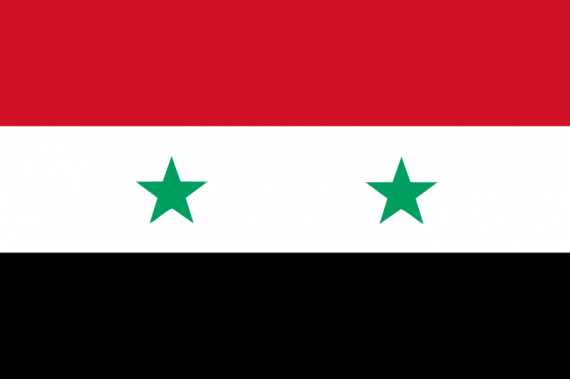

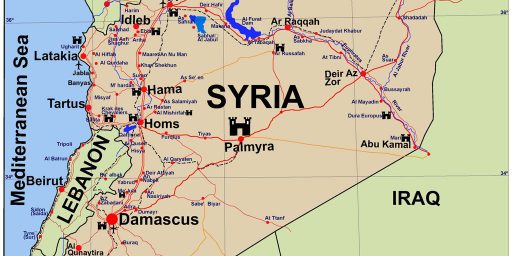
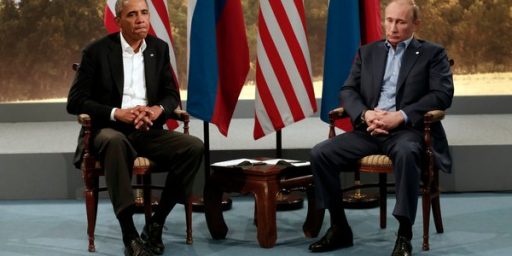
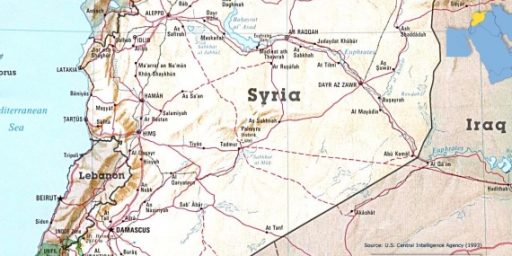
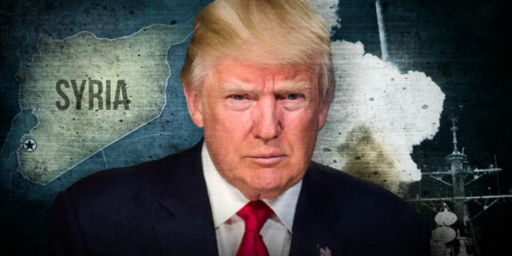
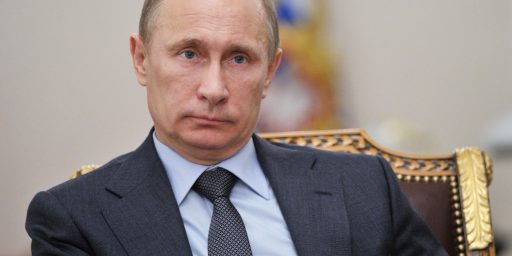
Turkey would be the obvious country to do something about Syria, but seeing as a bunch of its secular military leaders have just been arrested…
http://www.slate.com/id/2300537/
Yep, that’s a good round-up, Doug. Assad’s a f–king animal, just like his father.
This actually just proves why we should have never gotten involved in Libya. Now, it’s patently obvious what our intentions are, and I believe it makes us look worse to the world at large. Considering that was a large part of Obama’s charm, that’s not a good thing.
It shows dictators it’s pointless to peacefully give up their nuclear weapons program.
@Christopher Bowen: That makes no sense.